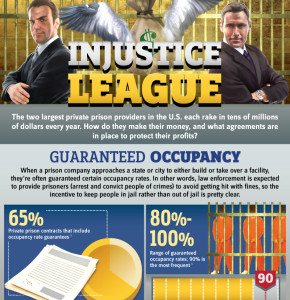Private Prisons: The Injustice League
The two largest private prison providers in the U.S. each rake in tens of millions of dollars every year. How do they make their money, and what agreements are in place to protect their profits?
Guaranteed Occupancy
When a prison company approaches a state or city to either build or take over a facility, they’re often guaranteed certain occupancy rates. In other words, law enforcement is expected to provide prisoners (arrest and convict people of crimes) to avoid getting hit with fines, so the incentive to keep people in jail rather than out of jail is pretty clear.
65% – Private prison contracts that include occupancy rate guarantees (1)
80%-100% – Range of guaranteed occupancy rates; 90% is the most frequent (1)
$2 million – Amount Colorado taxpayers have been forced to pay in so-called “low-crime” taxes because crime has dropped by about one-third in the past 10 years (1)
95%-100% occupancy contracts: (1)
- Arizona
- Louisiana
- Oklahoma
- Virginia
Money Talks
It’s little wonder that states and cities have allowed private prisons to move in. The biggest prison companies in the U.S., Corrections Corporation of America and the GEO Group, have spent millions lobbying and donating to political campaigns. (2)
CCA
$17.4 million in lobbying from 2002-2012
$1.9 million in political contributions from 2003-2012
GEO Group
$2.5 million in lobbying from 2004-2012
$2.9 million in political contributions from 2003-2012
Candidate Contributions
Which candidates have been the biggest beneficiaries of lobbying by private prison companies?
Top candidate recipients, 2013-14 (3)
CCA
Lamar Alexander (R-TN) $7,000
Chuck Fleischmann (R-TN) $5,000
Steve Fincher (R-TN) $3,500
Sherrod Brown (D-OH) $2,500
Rob Portman (R-OH) $2,500
GEO Group
Henry Cuellar (D-TX) $10,000
Mary L. Landrieu (D-LA) $5,000
Joe Garcia (D-FL) $4,000
Mark Begich (D-AK) $3,000
Pete Gallego (D-TX) $2,500
Sources:
1. http://www.inthepublicinterest.org
2. http://www.beyondbars.org
3. http://www.opensecrets.org

Source: Online-Paralegal-Programs.com
The post Private Prison Profiteers appeared first on Southern Coalition for Social Justice.
Written By Southern Coalition for Social Justice
Private Prison Profiteers was originally published @ Southern Coalition for Social Justice and has been syndicated with permission.
Sources:
Our authors want to hear from you! Click to leave a comment
Related Posts








A growing number of American county jail facilities are now contracted out as for-profit businesses to for-profit companies. The companies are paid by local or state government, and their profit depends on spending as little as possible on the prisoners and the jails. It’s hard to imagine any greater disconnect between public good and private profit: the interest of private jails lies not in the obvious social good of having the minimum necessary number of inmates but in having as many as possible, housed as cheaply as possible. No more chilling document exists in recent American life than the 2005 annual report of the biggest of these firms, the Corrections Corporation of America (CCA). Here the company (which spends millions lobbying legislators) is obliged to caution its investors about the risk that somehow, somewhere, someone might turn off the spigot of convicted men:
From the CCA 2005 Annual Corporate Report:
“Our growth is generally dependent upon our ability to obtain new contracts to develop and manage new correctional and detention facilities. . . . The demand for our facilities and services could be adversely affected by the relaxation of enforcement efforts, leniency in conviction and sentencing practices or through the decriminalization of certain activities that are currently proscribed by our criminal laws. For instance, any changes with respect to drugs and controlled substances or illegal immigration could affect the number of persons arrested, convicted, and sentenced, thereby potentially reducing demand for correctional facilities to house them”.
No better example exists of a private capitalist enterprise that feeds on the misery of man trying as hard as it can to be sure that nothing is done to decrease that misery.
Fortunately some local and state governments are learning that adding a profiteering middleman to manage jail services has added costs, not lowered them. Without evidence, private prison corporations always claim that their program will save the county and state millions annually. Despite many promises that jail and prison privatization will lead to big cost savings, such savings — as a comprehensive study by the Bureau of Justice Assistance, part of the U.S. Department of Justice, concluded — “have simply not materialized.” To the extent that private prison and jail operators do manage to save money, they do so through “reductions in staffing patterns, fringe benefits, and other labor-related costs.”
The standard technique of privatization: defund government services to make sure things don’t work and people get angry, then hand it over to private capital. By continuing to defund local jail services, the County Commission allows the for-profit, private CCA to appear to “rescue” the county jail program via self-serving profit-driven programs. It’s not long until privatization falls short in quality service when private jail program saves money by employing fewer guards and other workers and pay them badly. Frequently, horror stories often accompany how these jails are run .
We should demand that private corporate prisons and jails be removed from the administration of our local and state public prison programs . Privatization of jail services increases costs without any corresponding increase in quality or access to care.
As long as the general population remains passive, apathetic and seemingly unable to advocate for its best interests, the powerful in county commissions and their corporate partners will continue privatizing as they please — and laugh all the way to the bank.
*******************************************************
F. Douglas Stephenson, LCSW, BCD
Former President
The Florida Society for Clinical Social Work
*****************************************************************************
************************************************************************************